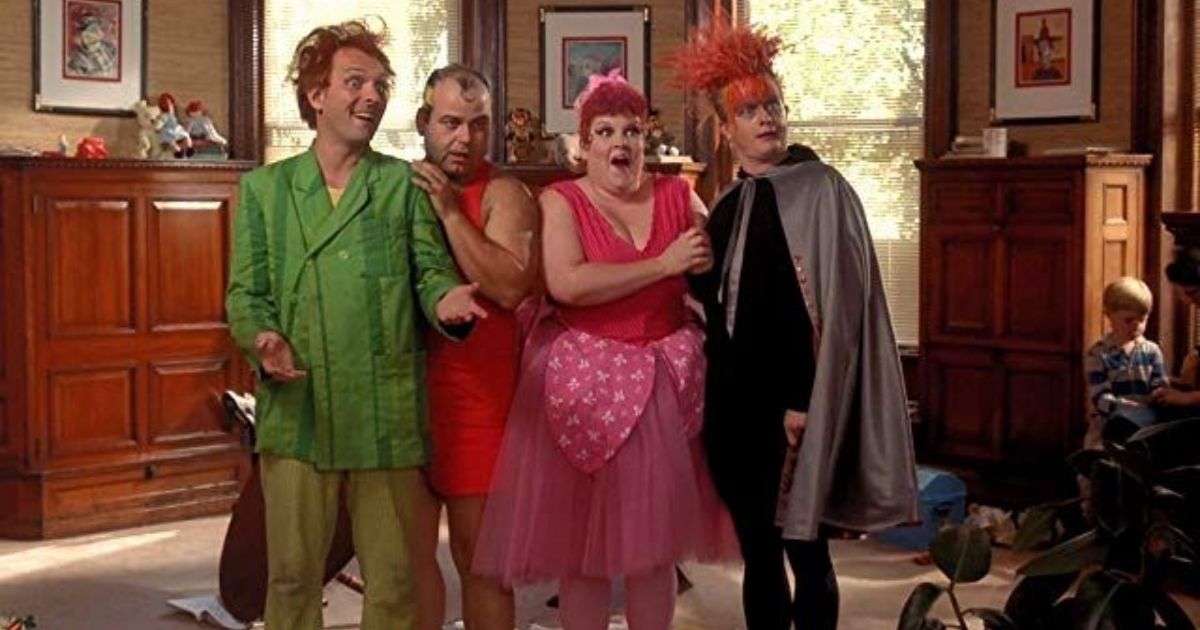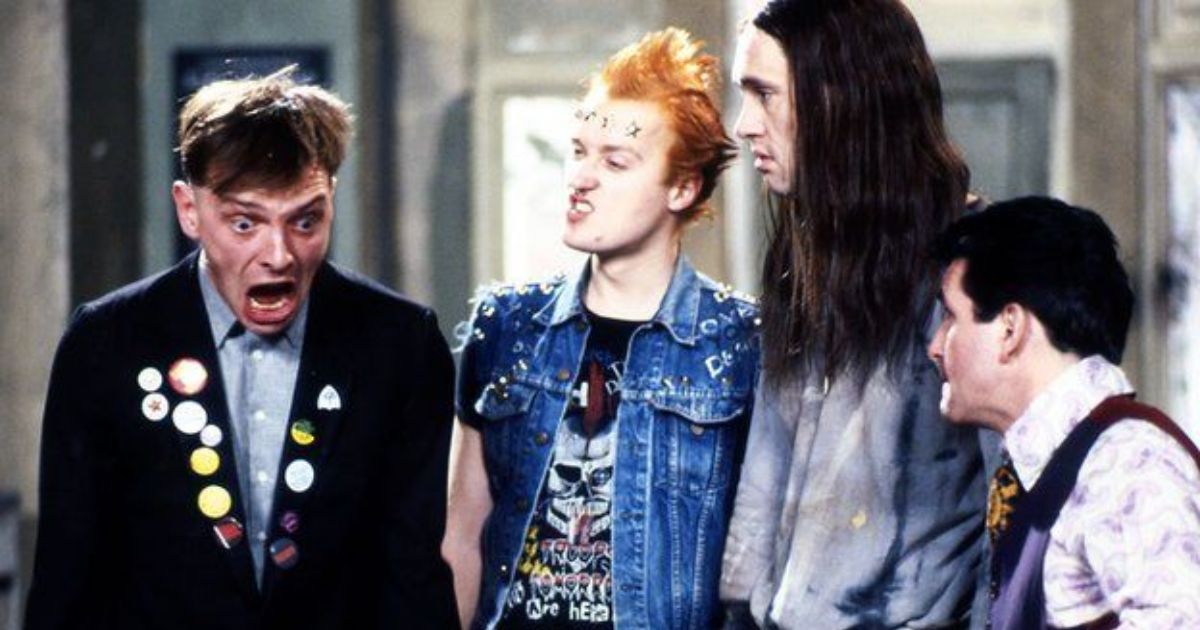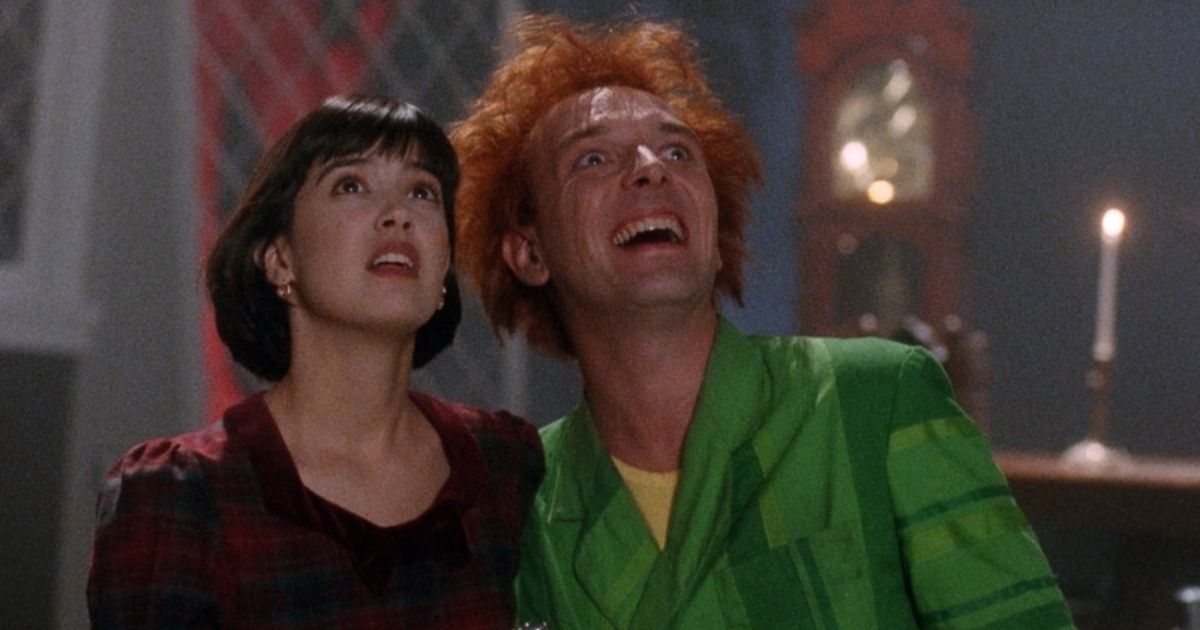Released in 1991, Drop Dead Fred is an American comedy starring Phoebe Cates as a woman having just been left by her partner, and featured Rik Mayall as her repressed childhood imaginary friend/imp/demon. Most famed now for English comic actor Mayall’s hurried and exhaustingly manic performance as the red-haired/green-suited Fred, the movie itself has found a second lease in life through its take on mental health in the most creative, appropriately imaginative, and colorful of ways.
Time is a healer. And Drop Dead Fred is an entity that, with a changing and now more nuanced approach to mental health in general, can have its straight jacket torn off and its subject inside re-analyzed. On release, the film was pretty much universally panned. Writing for The Chicago Tribune at the time, Gene Siskel had no love lost as he pitied the movie with zero stars and called it “easily one of the worst films I’ve ever seen.” While that’s not to say that Siskel was wrong — even now the film still really isn’t particularly good — attitudes have changed and the late Rik Mayall’s Looney Tunes-esque performance reveals a three-dimensional Bugs Bunny-adjacent stand-in for very human schizophrenia, regression, and poor mental health that could all lead to a person’s breakdown.
Lizzie Has a Bad Day
On the face of it, this is a disconcerting movie for kids with enough for parents to enjoy too (in the same vein as similar movies of the time like Roald Dahl’s The Witches). Fred is the loud version of the frustrated muttering we do when denied something. He is the intrusive thought and the devil on the shoulder of our protagonist, Lizzie. As the inciting incident (ridiculously) coincides with just one scene of Lizzie getting divorced from her partner, who has found someone new, having her handbag and car stolen, and being fired from her workplace, the woman all but totally regresses mentally and physically when opting to move back in with her controlling mother (Marsha Mason), or “The Mega Bitch” as Fred calls her.
Changing Attitudes
Schizophrenia at its most basic is a mental disorder where the sufferer, through hallucinations and delusions, may hear or see things that are not actually there. It’s in that that the movie makes it very clear that Fred is very much a part of Lizzie and vice-versa.
After Liz beats a violinist in a shopping mall she is apprehended and her mother takes her to a doctor who specializes in “imaginary friend syndrome.” Surrounded by children all in the same boat as Lizzie, in a clever twist on the setup, Fred can interact with her fellow imaginary friends, and yet she can’t see them. When finally prescribed medication, these embodiments of imaginary friends shudder away in fear knowing that they will rid their user of them, i.e. curing their beholder.
It’s here that the screenplay asks does proper medication negate, or even rid one of, their own imagination or childlike sense of wonder. Published by G.M. Goodwin via the Journal of Affective Disorders, after surveying 669 depression sufferers in 2017, the results suggested that 46% had side effects of “emotional blunting” from treatment. The film treats Lizzie’s option as a very real fear (in spite of and ignoring the very real possible benefits of treatment).
With such heavy and serious tones at its heart, the movie deserves re-analysis. Despite Drop Dead Fred‘s childlike and puerile approach to the story, underneath it’s focused on a woman put upon by a quickly escalated series of mishaps and pushed to breaking point. Almost like life is specifically against her, Lizzie’s role comes off as the straight man to her anarchic imaginary friend. Fred’s (and Mayall’s performance for that matter) outwardly childish and crude personality was panned most upon release but only makes sense for a fictional character originally dreamed up by Lizzie as an energetic infant with likewise infantile thoughts and humor.
Like it or not, Fred is unique to Lizzie and in turn, wouldn’t exist without her. Outside of that, no one can see Fred, and thus only assumes that Lizzie is the one causing the chaos, and talking to herself. Ultimately, while the film itself is childish — it rolls with that, and like all good movies with a younger audience in mind, doesn’t talk down because of that. Lizzie may seem “crazy” to everyone else, but as she is our focal character she is our (albeit wobbly) voice of the story and the one that we are rooting for throughout.
You’ve Got Mayall
And like a nasty version of Aladdin‘s Genie or (perhaps more aptly) Hellraiser‘s cenobites, summoned in a time of need (and also just like Pinhead trapped in a mystic box), Drop Dead Fred is a cursed being only out to cause chaos because it’s the where his enjoyment stems from — and the role is so fondly remembered for the casting of Mayall specifically, who clearly relishes the character’s trail of destruction.
Almost an English Jim Carrey, Mayall is obnoxious, zany, exhaustingly fast-paced, and distinctly loud. His rubber band energy is what keeps the film moving (and it’s no wonder that Drop Dead Fred was originally pitched to director Tim Burton, with Robin Williams to star). Far more known as a television actor via The Young Ones and Blackadder, Mayall’s few forays into the film world brought with it a strange collection of comedies including a hapless hotel owner in Guest House Paradiso (where his character’s name was “Richard Twat”), and Drop Dead Fred in particular remaining probably his most known work on the big screen — and certainly for its American audience.
Rik Mayall died at age 56 in 2014 from a heart attack. With such a lightning performance as the titular Drop Dead Fred, cult status for the movie was more than assured as fans remembered the performer.
Lasting Impact, Scars, and a Dead Remake
Of course, by the end, Lizzie does realize that the Charles that she has been pining after for the entirety of the film isn’t great, plain and simple, and that she’s much better off without him, and can finally summon the strength to best her bullish mother. And it’s only through Fred’s help that she can find that strength. It’s here that Fred and Lizzie complete their time together and Fred willingly passes on.
Talking with Little White Lies in 2021, director Ate De Jong notes the effect that time has had on his own movie.
“I appreciate it more now,” continuing, he says, “In the beginning, I didn’t see its uniqueness. The layer I tried to put in is that childhood trauma is only overcome if you accept and forgive yourself. Over the years, many people have told me they picked up on it and I’ve found the film has a very therapeutic value. Psychotherapists in California use it as a tool in their therapies for people with imaginary friends or who feel alienated from the world. The mental health angle was never discussed while we were making it. We were afraid New Line would cut the scene where Lizzie unwraps herself from her bed in the imagination world, basically setting herself free. Now, I think it’s one of the best things in the movie.”
And now, thankfully with no update on the to-be Russell Brand starring Drop Dead Fred remake (originally reported on over ten years ago) that looks dead in the water, and this uniquely weird and crass imaginary friend will stick around a little longer.
This story originally appeared on Movieweb




